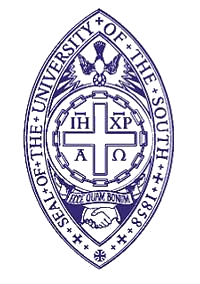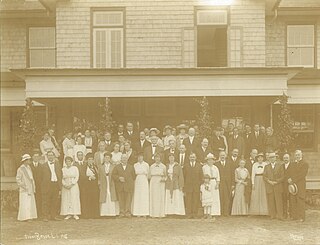
Monteagle is a town in Franklin, Grundy, and Marion counties in the U.S. state of Tennessee, in the Cumberland Plateau region of the southeastern part of the state. The population was 1,238 at the 2000 census – 804 of the town's 1,238 residents (64.9%) lived in Grundy County, 428 (34.6%) in Marion County, and 6 (0.5%) in Franklin County. The population at the 2020 census was 1,393.

The Chautauqua Institution is a 501(c)(3) nonprofit education center and summer resort for adults and youth located on 2,070 acres (8.4 km2) in Chautauqua, New York, 17 miles (27 km) northwest of Jamestown in the southwestern part of New York State. Established in 1874, the institution was the home of and provided the impetus for the Chautauqua movement that became popular in the US in the late 19th and early 20th centuries. The Chautauqua Institution Historic District is listed on the National Register of Historic Places and was further designated a National Historic Landmark.

The Bay View Association of the United Methodist Church, known as Bay View, is an example of two uniquely American community forms: the Methodist camp meeting and the independent Chautauqua. Designed for the first purpose in 1876 as the county’s only romantically-planned campground, and adapted for the second from 1885 to 1915, Bay View constitutes a well-executed ideal Victorian summer community that has remained in continuous operation since its foundation.

Sewanee: The University of the South, commonly known as Sewanee, is a private Episcopal liberal arts college in Sewanee, Tennessee. It is owned by 28 southern dioceses of the Episcopal Church, and its School of Theology is an official seminary of the church. The university's School of Letters offers graduate degrees in American Literature and Creative Writing. The campus consists of 13,000 acres (53 km2) of scenic mountain property atop the Cumberland Plateau, with the developed portion occupying about 1,000 acres (4.0 km2).
Nineteen Day Feasts are regular community gatherings, occurring on the first day of each month of the Baháʼí calendar. Each gathering consists of a Devotional, Administrative, and Social part. The devotional part of the Nineteen Day Feast can be compared to Sunday Services in Christianity, Friday Prayers in Islam, or Saturday Prayers in Judaism; however, the Baháʼí Faith has no clergy nor is congregational prayer performed at these meetings.

Glen Echo Park is an arts and cultural center in Glen Echo, Maryland, a suburb of Washington, D.C. Located about 9 miles (14 km) northwest of the city's downtown area, the park's site was initially developed in 1891 as a National Chautauqua Assembly.

Chautauqua is a private semi-gated summer resort that started as a 19th-century tent settlement. The name Piasa is taken from a nearby Native American painting of a mythical bird, called the Piasa Bird, which was painted on the bluffs high above the Mississippi River. Chautauqua is located between Elsah and Grafton in Jersey County. Today, it is bordered by and has access from the Great River Road. It has functioned as a private non-denominational Christian summer resort for over a century.

The Colorado Chautauqua, located in Boulder, Colorado, United States, and started in 1898, is the only Chautauqua west of the Mississippi River still continuing in unbroken operation since the heyday of the Chautauqua Movement in the 1920s. It is one of the few such continuously operating Chautauquas remaining in the United States, and was designated a National Historic Landmark in 2006. According to its governing body, the Colorado Chautauqua Association, it is also unique in that it is the only year-round Chautauqua.

The Community of St. Mary (CSM) is an Anglican religious order of nuns with independent houses located in Greenwich, New York, Sewanee, Tennessee, Mukwonago, Wisconsin, and also in Malawi and the Philippines.

Epworth Heights is a private summer community located on the Lake Michigan shore north of Ludington, Michigan, in the United States. Founded in 1894 by a group of Methodists as the Epworth League Training Assembly, it continues to operate as a domestic nonprofit corporation under Michigan's Summer Resort and Assembly Associations Act 39 of 1889. It is formally known as The Epworth Assembly, Inc.

William Porcher DuBose was an American priest, author, and theologian in the Episcopal Church in the United States. After service in the Confederate States Army during the American Civil War, in which he became a chaplain in his cousin's regiment, DuBose served as a Professor, Chaplain, and Dean of Theology at the University of the South in Sewanee, Tennessee. Later he served as Chaplain at Fairmount College in Monteagle, Tennessee and as priest-in-charge at the nearby Chapel of the Holy Comforter.
The Chautauqua adult education movement flourished in the late 19th and early 20th centuries, then declined. However, some Independent Chautauquas still operate today, and these are the 21st century Chautauquas. They are divided into two categories, Continuously Operating Chautauquas and Revival Chautauquas.
Arlington Beach is a hamlet in the Canadian province of Saskatchewan. It is located on the eastern shore of Last Mountain Lake, north-west of Regina. Listed as a designated place by Statistics Canada, the hamlet had a population of 39 in the Canada 2006 Census.

Epworth by the Sea is an 83-acre Christian conference and retreat center in Georgia, United States. It is used for Methodist-based events. It is located on the banks of the Frederica River, north of Gascoigne Bluff on Saint Simons Island, Georgia. The center was named “Epworth by the Sea” in honor of Epworth, the boyhood home of Charles and John Wesley, founders of Methodism. It is owned and operated by the South Georgia Conference of the United Methodist Church. Epworth is located on part of Hamilton Plantation which was purchased on October 29, 1949. It opened to the public in 1950, under the leadership of Bishop Arthur James Moore. Moore, from Georgia, was an elected bishop in the Methodist Episcopal Church, and also a leader of the Atlanta Area of the Methodist Church. At the start, the center featured only a few rural camp facilities and old plantation buildings. Epworth's stated mission is “to provide a Christian place for worship, study and fellowship.”

The Hindu Temple of Greater Chicago (HTGC) is a Hindu temple complex in Lemont, Illinois, established in 1977. The complex includes two separate temples:

The DuBose Conference Center, formally known as the DuBose Memorial Church Training School, is a historic site at Fairmont and College Streets in Monteagle, Tennessee. It was historically an Episcopal Church training and conference center. In 2009 the Conference Center became an independent, nonprofit 501(c)3 and now operates as a camp, conference and retreat center in Middle Tennessee.

Since 1895, Fountain Park has hosted an annual Chatauqua to promote traditional values and religious, social and educational activities. It was added to the National Register of Historic Places on December 7, 2001.

The Stony Brook Assembly was an evangelical organization that held a series of annual summer Bible Conferences and camp meetings in Stony Brook, NY on Long Island from 1909 to 1958. Nationally and internationally known speakers led conferences covering topics on religious, educational, and social reform. The assembly was also the parent organization which founded The Stony Brook School to use its grounds outside of the summer months. Though the assembly dissolved, the school still remains today.

The Winona Lake Historic District is located along the Eastern shore of Winona Lake in Kosciusko County, Indiana. Historically, it is perhaps best known as a major center within the evangelical Bible Conference Movement during the first half of the twentieth century, though these gatherings were just one part of the larger history of the town of Winona Lake, an area which has been a Chautauqua site, resort spot, and conference center. It has been listed on the National Register of Historic Places in Kosciusko County, Indiana, since 1993.

ChautauquaHall is a historic building in Pacific Grove, California, United States. It was built in 1881 by the Pacific Improvement Company for the Pacific Grove Retreat Association for presenting concerts and entertainment. On July 20, 1970, the building was declared a California Historical Landmark #839. In 2022 the hall hosts classes and programs for the city. This facility is Americans with Disabilities Act (ADA) compliant.
















